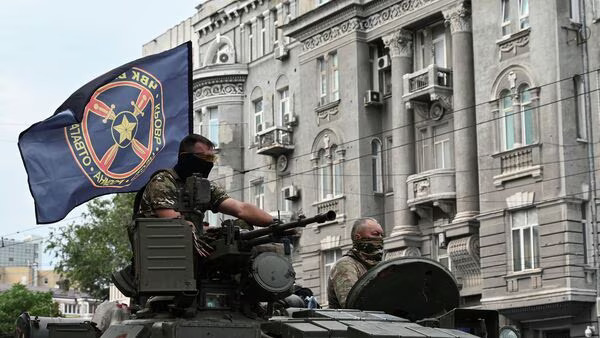Things unfolded in the most dramatic fashion with breathtaking speed in Russia during the past few days when Yevgeny Prigozhin, chief of Russia’s mercenary force, Wagner, rebelled against President Vladimir Putin. The world was taken by surprise by the suddenness of the development and what followed the mutiny in quick succession. Prigozhin slammed Russian Defence Minister Sergei Shoigu and Commander-in-Chief Valery Gerasimov and questioned the rationale of Russia’s invasion of Ukraine. Thereafter, Putin declared him a traitor and eventually gave him free passage to Belarus. The whole sequence of events is so baffling that no easy interpretation is possible. At this stage, it would be risky to read too much into the so-called rebellion which may be an outcome of Prigozhin’s own unbridled ambition or a ploy by Putin himself to either cut his own Defence Minister and Commander-in-Chief to size or hoodwink the West and Ukraine to open up a new frontier from Belarus with the help of Prigozhin. The time of war is used by many leaders to spread propaganda, lies and deception intended to confuse and mislead the enemy engendering in the latter a sense of false hope about the aggressor being in disarray.
True, the Wagner group’s armed mutiny, though very short-lived, has lowered Putin’s stature as a formidable man in full control of Russia in the eyes of the world. But then Putin has never been known to bother about his image. The mercenaries had taken over the Russian southern military command in Rostov-on-Don, a logistical hub for the Ukraine invasion, before racing towards the capital Moscow. Apparently, Putin was forced to warn of “a deadly threat to our state” and Moscow’s mayor urged residents to stay at home.
It could be that Prigozhin’s revolt was a desperate act to stop his private army from being incorporated into regular forces which would severely curtail his immense clout. This may also thwart his ambition to get greater importance in Putin’s hierarchy. He has been assiduously groomed by the President himself. His rise from a criminal to the leader of a mercenary force that supplied soldiers for fighting in at least 30 countries in the Arab world and Africa had the blessings of Putin.
Putin had himself pulled up Shoigu and Gerasimov in public recently for the way the latter had conducted the war with Ukraine. Viewed in this backdrop, Prigozhin could be working at the behest of Putin when he decried the two. But, confusion was confounded when Prigozhin attacked not only the execution of the war but its very rationale. This was a direct challenge to Putin’s leadership since it was the Russian President who had planned the invasion. No wonder, Putin immediately accused him of treason. It tended to create the impression that Prigozhin would be crushed as Putin had said in a recent BBC interview that he could pardon anyone except a “traitor.” Such a show of conflict did appear to indicate a serious power struggle in Russia.
But then there was another dramatic development with Prigozhin calling off the revolt as suddenly as he had begun, ostensibly to avoid Russian “bloodshed” meaning internecine war. The President of Belarus, Alexander Lukashenko, another protégée of Putin, appeared from nowhere. He negotiated a settlement with Prigozhin who was given safe passage to his country, while Moscow announced no action would be taken against his soldiers.
This could mean the whole thing was scripted to fool Ukraine and its Western allies about Putin’s plan to cleverly move Prigozhin and his soldiers to Belarus for launching attacks on Ukraine from there as the Wagner has proved its mettle in carrying out ruthless war producing results in Bakhmut in Ukraine and other foreign soils.
Now the question is if the whole episode had Putin’s approval, has he not taken too many risks since his grip over the country would appear to be loosening? The answer could be that the Russian President can claim to his people that he has shown his astuteness by packing Prigozhin off to Belarus, while later events may prove whether the rebellion was a master strategy to open a new theatre of war against Ukraine. It is unlikely and difficult to believe that a master spy that Putin is, was unaware of or in the dark when the rebellion was brewing in his private army.
